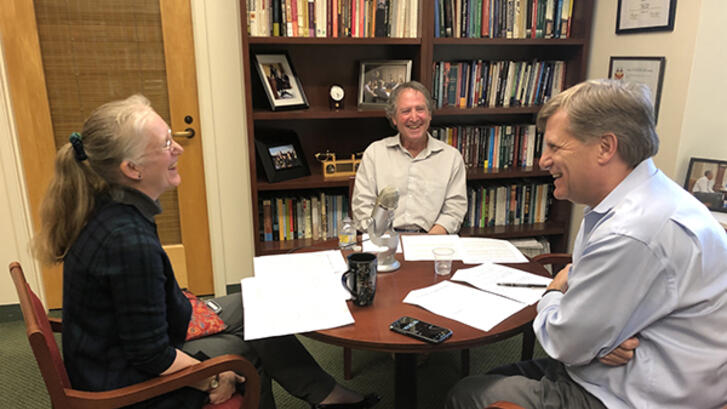Our Future Depends on Achieving Immunity to COVID-19 Together
Our Future Depends on Achieving Immunity to COVID-19 Together
On the World Class podcast with Michael McFaul, guests David Relman and Michelle Mello say progress will likely be uneven with states each pursuing varying degrees of social distancing and shelter-in-place policies

A lot has changed in the three months since David Relman was last on the World Class podcast to discuss COVID-19 and its impact on China. “It feels like it’s been three years,” joked Relman, who is a senior fellow at the Freeman Spogli Institute for International Studies (FSI) and an expert on emerging infectious diseases.
Scientists are still discovering unexpected clinical features of COVID-19 on a daily basis, ranging from rashes on the feet of children to unusual kinds of organ failure, Relman told host Michael McFaul. He expects that the virus won’t be going away any time soon.
“It’s established itself in human populations around the globe, and it looks like it’ll be with us for at least the next few years, possibly longer,” Relman said.
What the next few years will look like, Relman noted, will depend on immunity: how well humans are able to develop immunity, how durable that immunity will be, and whether we can hasten the development of immunity with a vaccine.
In the meantime, in the U.S., it has largely been up to the states to implement their own rules for containing the spread of COVID-19 due to the nature of federalism — the constitutional structure dividing power between the national government and state and local governments — said Michelle Mello, a core faculty member at FSI and an empirical health law scholar.
Most of the time, federalism works well as it provides a check on tyranny and allows different states to express different values, Mello said. But in the context of the COVID-19 pandemic, it hasn’t been as successful as many Americans would like.
“The powers we left with the federal government have not been well used, and the discretion afforded to the states has been used wisely by some and not by others,” she said, pointing to states in the west and northeast — with the exception of New York — as examples of success stories in arresting the spread.
“To me, it’s the states that have strong leadership, a strong belief in the importance of a good health system, and a willingness to embrace the value of doing good public-health science on the fly that have done a better job,” added Relman.
Now that several states are beginning to relax social distancing orders, the big question is how and when to reopen the economy. Public health officials are working hard to come up with a framework that takes the economic and health tradeoffs into consideration, but they’re all starting from square one, Mello explained.
“How do we do it? Nobody has any idea,” Mello said. “Every state is going to have a different weighing of economic health versus physical health, and public health officials have to do their best to try to filter those public preferences in a responsible way and effectuate them with the best available data. There is no playbook for this.”
Mello added that she finds the United States’ framing of the situation as a zero-sum game between economic health and physical health problematic. Several European countries have avoided that framing by having their respective governments step in to provide a safety net for those who need access to healthcare or who are out of work. So far, there has been no indication that the U.S. plans to take similar measures.
“That’s why it has been framed in terms of a choice between working or being healthier — between having a paycheck and not having COVID-19,” she said. “It does not have to be that way. I think that the central lesson to be confronted from this epidemic going forward is that we don’t want to put ourselves in a situation where we have to make that choice again.”



